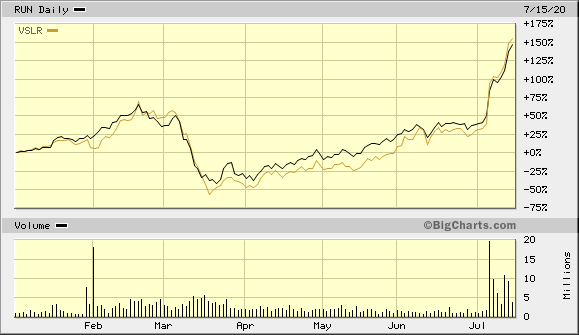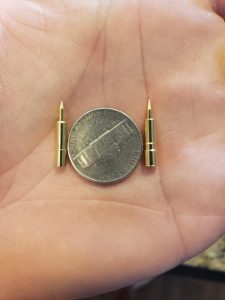In every crisis, there are some who smell an opportunity.
Our current crisis is no exception to that rule.
In previous issues of Emerging Profits Daily, we’ve covered many of these new opportunities born out of the COVID-19 crisis.
Gold, pantry essentials, and the video game industry have all proven quite valuable with millions locked down and work-from-home numbers spike.
But there are some opportunities that might not be as clear. One is only coming into light right now because of a behemoth deal.
Deal of This Century
Last week, Sunrun Inc. (NASDAQ: RUN) announced a $3.2 billion deal to purchase Vivint Solar Inc. (NYSE: VSLR).
This new company will create one of the largest solar panels businesses in the world.
Investors are ecstatic about this combination:

As you can see, the shares of both companies had been recovering from their massive mid-crisis falls. But upon the announcement of this deal, both stocks skyrocketed.
This is just the start. As you’ll see, both companies have room to run.
But before that, it’s important to understand why the creation of such a mega-company in the solar panel industry is so pivotal right now.
Solar Panel Crisis: Part One
The price of solar panels has been coming down steadily over the last decade. By early 2020, interest in new installations was peaking to all-time highs. Both of these companies were seeing record sales and even stronger potential interest.
But then crisis struck.

Grab a piece of paper and pen to write this down…
Because you’re about to see the name and ticker symbol of the ONLY 5G STOCK every investor should own.
You can get the name and ticker of this company right here, no strings attached. But you better act fast…
Because the Federal Communications Commission, the government agency in charge of 5G, just scheduled a major announcement that would send shares soaring once announced.
Don't miss out. Click Here to Get #1 5G play for 2020 before the next market close.
The economy began cratering. The number of people willing to shell out the money to install these panels collapsed. And worst of all, the whole infrastructure for sales of these installations shattered.
The lockdowns ended door-to-door sales and the desire to let installers into people's homes. That’s the whole business model. When all of that abruptly stops, you can see where the problem is.
The Solar Energy Industries Association said that 80% of the 100,000 COVID-19-related job losses in the solar industry came from the rooftop installers.
After peaking a month earlier, by mid-March it was apparent that no one wanted new solar panels, no matter the benefits.
That’s part one of this story. The second is how companies like Vivint and Sunrun responded.
Solar Panel Crisis: Part Two
Vivint saw sales plummet 60% as lockdowns went into effect. But through a much-needed change, it cut those losses in half by early May.
The boots-on-the-ground sales approach this whole industry uses is expensive. Paying thousands of people to walk around from house to house knocking on doors costs a lot of money it turns out.
This crisis fired a shift in strategy earlier than Vivint expected. It had already planned on switching over to less costly phone canvassing. But COVID-19 pushed that schedule forward.
Sunrun was even more aggressive. It launched online sales teams, higher online marketing and huge promotions like home solar power for $1 per month for half a year.
Combining the two strategies made perfect sense. But the deal struck last week has a lot more to like.
The True Beauty of this Deal and its Timing
The amount of savings this combination creates is estimated at $90 million annually. It brings nearly half a million customers and more than 3 gigawatts of solar energy under one roof.
But more importantly, it creates a mini-monopoly.
You can think of solar companies like cable providers. There are several. But you’re stuck with only one or two options in any one area.
The deal comes at the perfect time. They are able to combine assets and shore up their combined balance sheets under a zero-interest-rate environment.
That is also the appeal for their customers. As consumer spending gradually increases from lockdown-lows, solar installations start looking a lot more appealing.
With new home sales still in the toilet, many are renovating and updating their own houses. That’s the exact right market for this industry.
And with huge cost savings from the shift in sales strategy, this large combined company is able to offer incentives right now.
Sunrun estimates that the shift to virtual sales and automating permits will save about $2,000 per installation. That’s a huge discount it can offer right off the top.
Both companies have been on fire since the announcement. But there’s plenty of room to run here. The deal isn’t expected to finalize until the end of this year. So, you have time to pick up shares in either, or both.
Now’s a great chance to get in on the deal of the 21st century.
To your prosperity,
Joshua M. Belanger
Executive Publisher & Founder